Mice can get into your home in a matter of seconds, leading to a dirty space that’s no longer pleasant for humans. The fact is that mice are more difficult to deal with than many people think. That’s why getting them out as quickly as possible is important.
You also need to understand how mice get into your home in the first place. This knowledge will help you safeguard your home in the future so mice don’t get into your house again! After all, getting rid of them once they’re inside can be a major challenge and a huge headache you’d rather avoid altogether.
[toc heading_levels=”2″]
Why Do I Have Mice in My House?
There’s no one main reason people have mice in their home. Instead, there are a few common causes of mice that can be a major problem for homeowners and renters. While the time of year does impact how many mice are likely to get into your home, the fact is that they can access your house all year long if you let them.
Common reasons people have mice in their house include:
- Unsanitary conditions.
- Damaged windows, doors or other entry points.
- Poorly kept yards.
- Nearby access to wilderness or areas where mice tend to live naturally.
These are just a few of the most common reasons people get mice in their home. There are other reasons and figuring out what is attracting mice to your home is an important next step when it comes to learning how to keep mice out of your house for good.
What Attracts Them?
Mice are attracted to a handful of different things, and if those are easy to find on your property that could be one main reason you have mice. It’s still possible to get mice without these things on your property, but taking care of these issues is a smart first step toward remedying the problem for the long-haul.
- You have debris in your yard that creates an ideal hiding place or nesting area for mice.
- You have food sources outside your yard that are ideal for mice. Fruits and seeds are attractive to wild mice looking for food to sustain themselves and their young.
- Your home is not clean. Unclean conditions can bring mice to your yard and toward your home. Even considerable clutter can create a safe haven for mice looking for shelter.

What Causes Them?
Most people are not to blame for their problems with mice. Even if you are doing something that’s bringing them to your property, you probably don’t know about it. For most people, fixing the problem of what’s causing mice on their property is relative simply.
To do that, you need to determine what is causing them in the first place.
Common causes of mice on your property include:
- Pet food. Pet food inside or outside your home is often a main attraction for mice looking for sustenance.
- Fecal matter. Fecal matter from cats or dogs in your backyard can be attractive to mice.
- Fecal matter inside your home like in a litter box for your cat. While litter boxes are common, keeping them in places where they can attract mice – like outside – is typically not recommended.
- Bacterial growth around your home. Mice are often attracted to this scent and environments where conditions are less than ideal for humans.
- Cold or hot weather. In many cases, mice are looking to come into your home to find a better climate and food source at the same time. Cold and hot weather can be problematic for mice, especially when they’re hunting for food for themselves and their young.
Why Do Mice Keep Coming in My House?
Dirty, unkempt homes are a major problem for homeowners dealing with mice. A dirty space isn’t the only reason that mice could keep coming in your home though. In fact, some reasons have nothing to do with keeping a dirty home at all.
Here are a few reasons mice keep coming into your home:
- You have cracks around your façade that allow mice to enter with ease.
- You have an attached garage that allows mice to enter and wait for an access point into your home. Mice are more likely to stay in your garage if it is dirty, dusty, or full of bacteria.
- You have an excess amount of mice on your outside property. This can cause mice to get into your home even if they are not looking for a way in regularly.

Why Do They Come in the Summer?
Summer is a time of year when many people notice more and more mice getting into their houses. While there are many reasons for this, and some are not related to the season at all, there are summer specific issues that could be leading to your mouse problem.
Common reasons mice come into your home in the summer include:
- You leave doors and windows open during the day or at night for cool air. Mice may simply enter your home even if it’s clean and well-kept if you give them easy access.
- There are holes in your screens. Many people don’t notice small holes in window screens, but mice can fit through very tight spaces.
- There is little shelter in your area and mice are looking for cover. If they have an access point, mice will come into your home just to get away from the sun and heat while searching for a food source.
Common Places
Mice can get into your home in a variety of different ways. While you’ll need to learn how to catch a mouse once it’s inside, knowing where they prefer to get in can help you prevent them in the future.
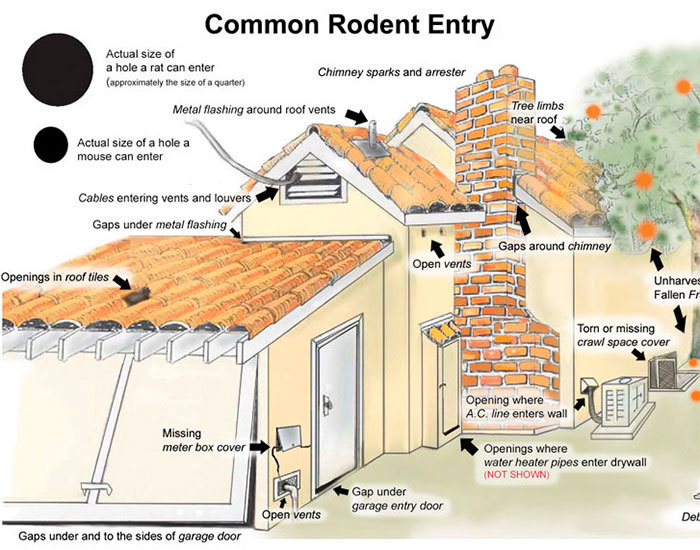
Here are some common places for mice to get into your home:
- Holes in your walls. Any hole in your wall that faces the outside of your property can be a target for mice looking to get in.
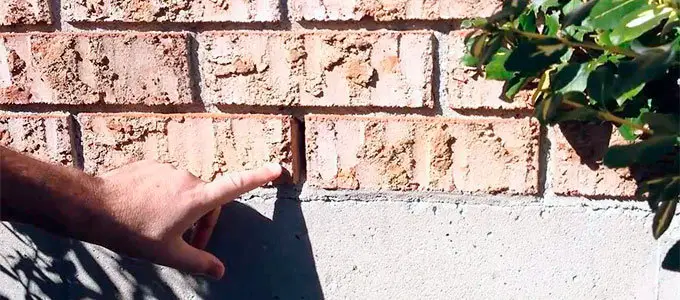
- Holes around doors and windows. These are easy access points for mice attempting to get into your home.
- Access points that lead to the exterior of your home like the garage. Go here to learn how to get rid of mice in garage.
- Exposed attics and basements. These also make ideal hiding places for mice since you don’t likely spend much time in these areas. The good news is that you can learn how to get rid of mice in attic and basements relatively quickly, especially if they are contained to these areas and not in the rest of your home.
Many people don’t worry about very small holes on their property, but this can be a major mistake. Small holes may not be big enough for mice to fit into, but over time, they’ll chew away at your facade, enlarging the holes until they fit.
Mice can squeeze through very small spaces, so you’ll need to ensure that all holes are properly sealed around your home.
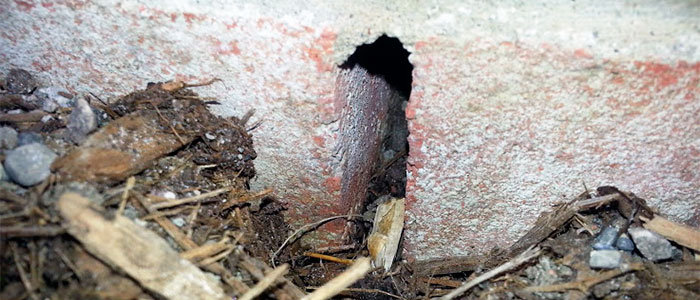
Can They Eat Through Wood and Metal?
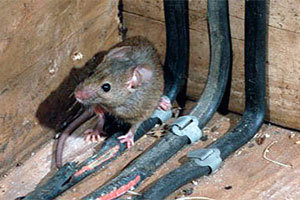 Mice can chew through a lot of materials, gaining access to your home fairly quickly. The worst part for homeowners is that a mouse can turn a tiny hole into a big one within just a few hours if they’re diligent enough.
Mice can chew through a lot of materials, gaining access to your home fairly quickly. The worst part for homeowners is that a mouse can turn a tiny hole into a big one within just a few hours if they’re diligent enough.
While mice can eat through wood over time, it’s often a more difficult material to chew through than plaster or drywall. Metal is too hard for mice to get through, making it an ideal patching material for areas where mice tend to gain access to your home.
What Can Mice Chew Through and What Can’t They?
Drywall, plaster, plastic and wood are all common housing materials that mice can chew through with ease. If you’re looking to repair an area where mice have gotten into your home, you’ll need to be extra careful about using these materials and ensuring that no cracks or gaps are left. Learning how to get rid of mice in walls before patching holes is also important.
Block off areas you’re repairing with materials like drywall or plaster if you have a mouse problem. Once these materials are dry and there are no cracks, it isn’t likely that mice will consider these entry points anymore. When the materials are soft and drying they can still be problematic for homeowners dealing with mice.
Metal and cement are ideal materials to block mice from entering your home. These materials are too hard for mice to chew through even if they are persistent and want badly to get into your home.
Finding Out Where Mice Are Entering
Mice can get into your home through a number of entry points. Tracking them down isn’t always easy.
Follow these steps when searching for the areas where mice are getting into your home:
- Look for areas where there are cracks around your property including doors and windowsills. These are the number one place for mice trying to get into your home to do it.
- Check for mouse droppings around your property. These are a sure sign that mice have been in the area.
- Search for potential food sources like fallen fruit and seeds. These are major sources of food for wild mice and they could be the reason they’re hanging out around your home.
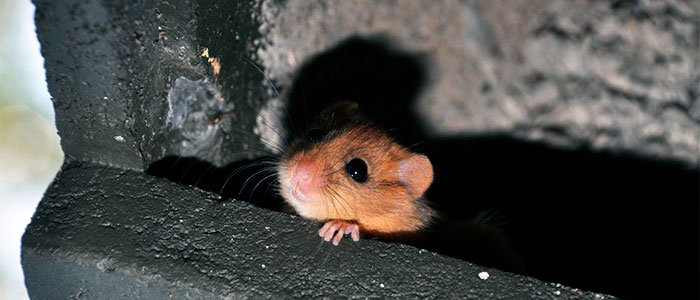
How to Stop Mice from Squeezing Under the Door
In some cases, mice can squeeze under a door, getting into your home. This typically happens with older homes where doors shrink over time, especially if they are made of wood. There are some options to keep mice from getting into your home by going under your doors though.
Common methods for stopping mice trying to get in under doors include:
- Using metal guards or fittings under your door. These help connect the door to the ground so there’s no space for a mouse to get through. Metal is too hard for mice to chew through as well.

- Adding weather-stripping. This has the benefit of helping keep your house more comfortable.
- Replacing old doors with newer models made of harder materials mice that are not cracked or damaged.
How Small a Space Can a Mouse Fit In?
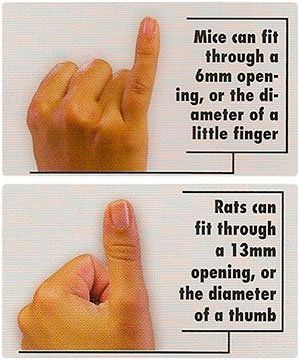 A full-grown mouse could fit in the palm of your hand, so they’re not exactly big creatures to begin with. When they need to contort their bodies, they can fit in even smaller spaces. With adolescent mice, a hole or opening the width of a pencil is enough to squeeze through. Adult mice can squeeze through a space no bigger than a dime.
A full-grown mouse could fit in the palm of your hand, so they’re not exactly big creatures to begin with. When they need to contort their bodies, they can fit in even smaller spaces. With adolescent mice, a hole or opening the width of a pencil is enough to squeeze through. Adult mice can squeeze through a space no bigger than a dime.
This is why making sure your home is properly cared for, especially during the time of the year when you nice mice, is so important. If you’re not vigilant, they could get into your home through an opening so small you might miss it.
How to Mouse Proof My Home
Keeping mice out of your home for good isn’t a complex task or something that you can’t handle alone. The most important thing is to keep a clean, tidy home and property at all times. Doing this will ensure that mice have less interest in your property and don’t attempt to get inside.
From there, you’ll need to make sure that access points like windows and doors are properly blocked. Even in the summer, heavy-duty metal screens are a must to keep mice out. Click here to learn how to get rid of mice.
If you find that you can’t deal with mice on your own, seeking professional help is often recommended. Mouse exterminators can help you come up with solutions to keep your home mouse free so they don’t come back once they’re gone.

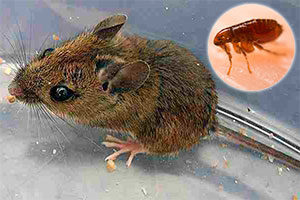
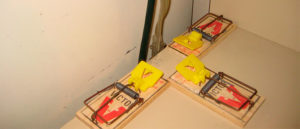

Can a mouse get into my box spring under my bed